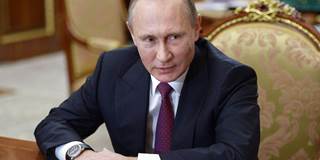By gaining a foothold in the Middle East, Vladimir Putin hopes to revive Russia’s long-faded image as a world power, restore its status as America’s main geopolitical foil, and gain bargaining chips with which to promote his more immediate concerns in Russia’s near-abroad. But Russia’s position in the region remains fragile.
NEW YORK – The United States has lost two asymmetric wars in modern times: one against the Vietcong in Vietnam, and another against terrorist groups in the Middle East. When its defeat became apparent in Vietnam, the US pivoted away from the region, leaving the victor to clean up the mess – and, ultimately, to join the ASEAN structure of security and cooperation. The Middle East has been more difficult to leave behind, despite America’s best efforts, and remains wracked by conflict and shaken by shifting alliances.
For Russian President Vladimir Putin, the region’s turmoil represents an important opportunity. By gaining a foothold in the Middle East, he hopes to revive Russia’s long-faded image as a world power, restore its status as America’s main geopolitical foil, and gain bargaining chips with which to promote his more immediate concerns in Russia’s near-abroad. Success in these areas, he calculates, will cement his power and popular support at home.
On these fronts, Putin has made some progress, embedding Russia firmly within Middle Eastern politics. But Russia’s position in the region remains fragile. It is not currently capable of helping to establish – much less oversee – a new regional order, for a simple reason: the Kremlin lacks true allies there.

NEW YORK – The United States has lost two asymmetric wars in modern times: one against the Vietcong in Vietnam, and another against terrorist groups in the Middle East. When its defeat became apparent in Vietnam, the US pivoted away from the region, leaving the victor to clean up the mess – and, ultimately, to join the ASEAN structure of security and cooperation. The Middle East has been more difficult to leave behind, despite America’s best efforts, and remains wracked by conflict and shaken by shifting alliances.
For Russian President Vladimir Putin, the region’s turmoil represents an important opportunity. By gaining a foothold in the Middle East, he hopes to revive Russia’s long-faded image as a world power, restore its status as America’s main geopolitical foil, and gain bargaining chips with which to promote his more immediate concerns in Russia’s near-abroad. Success in these areas, he calculates, will cement his power and popular support at home.
On these fronts, Putin has made some progress, embedding Russia firmly within Middle Eastern politics. But Russia’s position in the region remains fragile. It is not currently capable of helping to establish – much less oversee – a new regional order, for a simple reason: the Kremlin lacks true allies there.